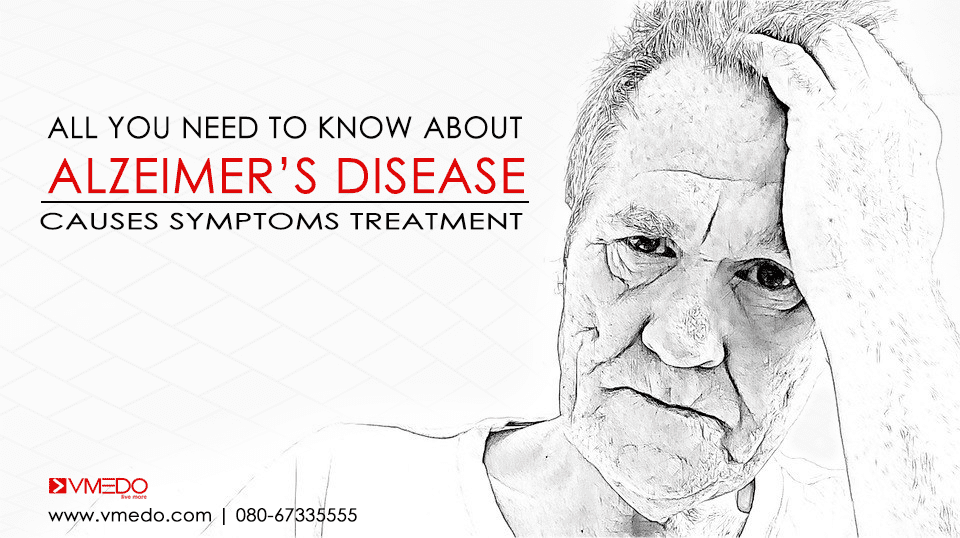What is Alzheimer’s disease?
Alzheimer’s disease is a progressive brain disorder that destroys the brain’s nerve cells or neurons that result in loss of memory and other important mental functions that include thinking ability and behavior.
At first, someone with Alzheimer’s disease may notice mild confusion and difficulty remembering. Eventually, the victim may even forget important people, events and undergo dramatic personality changes & eventually, it also destroys the ability to carry out the simplest daily tasks.
Symptoms of Alzheimer’s disease:
Alzheimer’s disease is currently ranked as one of the leading cause of death, just behind heart disease and cancer, in older adults.
The most common Symptoms of Alzheimer’s disease include:
- Poor Memory or serious memory loss.
- Difficulty in completing familiar.
- Impaired or poor judgment.
- Difficulty in remembering things & newly learned information.
- Slowed thinking, Deepening confusion about events, time, appointments and place.
- Rapid Disorientation, mood, and Behavioral
- Unfounded suspicions about family, friends and professional caregivers.
- Vision Problems.
- Misplacing things and lack of ability to retrace it.
- Deterioration of social skills.
Causes of Alzheimer’s Disease
The exact cause of Alzheimer’s disease is still not known. And it is believed that it is caused by the combination of age, lifestyle, genetic and environmental factors that affect the brain over time.
Here are few possible reasons that trigger Alzheimer’s disease
Age: Age is the most significant factors in the development of Alzheimer’s disease.
Genetics/ Family history: This is the second biggest risk factor after age. Parents or close family member with Alzheimer’s disease can contribute to your risk of developing the disease, although the actual increase in risk is marginally higher than that of someone who has no family history of this condition.
And people with a family history of Alzheimer’s disease, the symptoms may start at a relatively early age (between 40 to 65 years of age).
Down’s syndrome: People with Down’s syndrome are at a higher risk of developing Alzheimer’s disease.
Past Head injuries/ trauma: People who have had a severe head injury have been found to be at higher risk of developing Alzheimer’s disease.
Lifestyle & Heart Health: Research shows that several lifestyle factors and conditions associated with cardiovascular disease can increase the risk of Alzheimer’s disease.
These include:
- smoking
- obesity
- diabetes
- high blood pressure
- High cholesterol
- Lack of exercise
- Poorly controlled type 2 diabetes
- Lack of nutritious food
Gender: Women seem to be more likely to prone to Alzheimer’s disease than men because they live longer.
How is Alzheimer’s disease diagnosed?
There is no single test to identify Alzheimer’s disease. The diagnosis is made only after careful clinical consultation, and complete medical assessment, and symptoms. Your doctor may conduct several tests to assess memory impairment & thinking skills, judge functional abilities, and to identify behavioral changes.
The clinical diagnosis might include:
- A detailed medical history.
- Thorough physical and psychological tests.
- Blood and urine tests
- Lumbar puncture for cerebral spinal fluid tests
- Interviews with friends and family. Doctors may ask your family member or friend questions about you and your behavior.
- Different types of brain scans, such as Computed Tomography (CT), Magnetic Resonance Imaging (MRI), and Positron Emission Tomography (PET).
Also Read: Junk food is rendering you with memory loss
Treatments for Alzheimer’s disease
Currently, there is no complete cure for Alzheimer’s disease & the present medications can only help with the symptoms of Alzheimer’s & they can’t completely reverse them.
Current, drug and non-drug treatments may help with both cognitive and behavioral symptoms and improve the quality of life for people with dementia & helps in the brain work better for longer.
The other regular treatments that can improve the condition include, Regular exercise, Activities such as a daily walk helps in improving mood and maintain the health of joints, muscles and the heart.
There are few medications that can increase the boosting levels of a brain-cell communication and control the behavioral symptoms associated with Alzheimer’s disease. And these medications are prescribed based on your age, medical history, overall health, your lifestyle and many other factors.
Various vitamins, omega-3 fatty acids, Curcumin, herbal mixtures, and other supplements are widely promoted as a support to prevent or delay Alzheimer’s symptoms. But so far, these mixtures have found no benefit for treating Alzheimer’s disease on clinical trials.
Other than medications, the right approach and care can help your loved ones maintain a high quality of life even in the phase of dementia. Caregivers, staying in the familiar surroundings can keep patients with Alzheimer’s feeling safe and loved.
Prevention Of Alzheimer’s disease
There is a lot of research work undergoing to find the right risk factors associated with Alzheimer’s disease, so there may be some lifestyle measures that can reduce the risk of Alzheimer’s disease. Research is going on heart health, diet, exercise and keeping an active brain to prevent Alzheimer’s disease.
But there are few risk factors that we can’t control for Alzheimer’s disease such as age and genetic profile. Research suggests that certain lifestyle factors, such as a nutritious diet, exercise, healthy lifestyle, and social engagement, might help in reducing the risk of Alzheimer’s disease.

